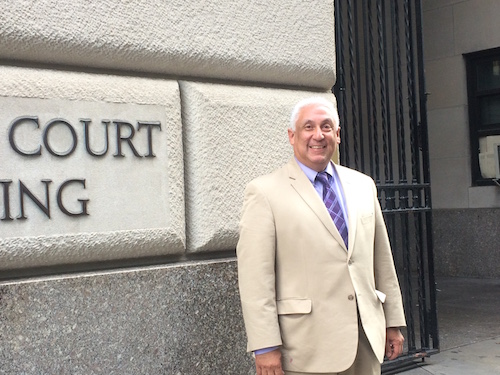Mayor Bill de Blasio on Friday announced the appointment of Judge Frederick Arriaga to the Criminal Court bench as part of a series of judicial appointments including five judges to Family Court, 18 to Criminal Court, and three to Civil Court. These judges span a wide spectrum of experiences, and are uniquely qualified to serve New Yorkers.
Arriaga was one of two incumbents running among 11 attorneys vying for five open Kings County Civil Court Judge seats in last September’s primaries. He finished sixth, barely off the mark, which saw five women including Connie Melendez, Robin Sheares, Patria Frias-Colon, Sandra Roper and Ellen Edwards all winning spots on the bench.

“The seasoned, committed and impartial judges appointed today are what New Yorkers deserve in court,” said de Blasio, of his recent round of appointments. “I look forward to working with these new and re-appointed judges, who have the diverse experience, both personally and professionally, to represent the best interest of all who call this great city home.”
Arriaga was elected to the Civil Court bench in November 2007 and has been serving in Criminal Court. He became an Acting Supreme Court Justice in January 2013. He previously served as Counsel to former Brooklyn Borough President Marty Markowitz and worked for South Brooklyn Legal Services. He graduated from the University of Florida and Brooklyn Law School.
Like Melendez, Sheares and Frias-Colon, he had the backing of the Kings County Democratic party, and KCP has had a number of sources in the legal field say he is a very well regarded member of the bench.
According to an Aug. 15, 2017 KCP profile of Arriaga, once he was designated as an acting-justice of the Brooklyn Supreme Court, his current role became the Screening Treatment & Enhancement Part (STEP) Program judge or STEP judge.
STEP is a special courtroom in the Brooklyn Criminal Court for first time felony offenders arrested who face felony drug charges and who also abuse drugs. Individuals are given the choice to either join the drug treatment program or face jail or probation. The program aims to reduce recidivism and help keep first time offenders out of jail and off of drugs with a court mandated drug treatment program that includes regular court appearances and supervision.
“If you complete the program, for a first time offender this [STEP] is a great thing because you leave with a clean record, and for people who already have a criminal record or have been a drug addict for 20 or 30 years, they are going to finally be able to make a change in their lives,” said Arriaga.
“A lot of what I do is motivate. And that takes two forms, one is commending people and acknowledging and rewarding people for making the right choices. And then for the people who are making the wrong choices, we have to hold them accountable for it,” added Arriaga.
The experienced judge takes his job very seriously on the bench and wants to continue his work as a civil court judge so that he can continue bringing fairness to Brooklynites in the courtroom.
“When you’re in a criminal proceeding as a judge you’re basically dealing with somebody’s liberty. That’s a huge responsibility that you have to take very seriously. You have to consider thoughtfully and you have to apply the law in an impartial and fair manner. Objective justice is a fundamental component of being a judge,” said Arriaga.
Arriaga said it is the nature of the court system that someone is going to leave the courtroom feeling like they won and someone is going to leave the courtroom feeling like they lost, but if a judge does his job correctly all litigants should leave the courtroom feeling that they at least had their day in court and were treated fairly.
“Judges are human beings, we live in the community, we have lives. Being able to connect with people in a personal way is important, ” said Arriaga.










